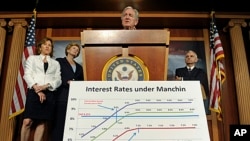Seven million low-income U.S. college students face higher costs unless President Barack Obama and both Democrats and Republicans in Congress reach an agreement by July.
Many experts doubt the bickering politicians will act in time to prevent a doubling of the interest charged on education loans for students who need the financial help the most. This dispute comes as a college education is more important than ever to get good jobs, and college costs are soaring.
About one-third of college students in the United States rely on low-cost loans that are subsidized by the government.
Right now, the interest rate is 3.4 percent a year, but it will double to 6.8 percent if Congress doesn't act.
That could add up to thousands of dollars in additional repayments if low-income college students borrow $20,000 or more for the four years of undergraduate studies.
Spencer Hughes, student government president at Iowa State University, says the higher costs will hurt the students who can least afford it.
"For many of them this assistance is necessary for them to be able to afford a college education. So there are going to be some serious considerations if it is worth it for me to consider pursuing a degree with this increased burden," said Hughes.
Hughes says students are fed up with politicians who spend their time blaming each other for the impasse. He says it is time for Congress to do its job and reach an agreement so students know what their costs will be as they pursue higher education.
The evolving debate includes some who want to extend current rates, while others say it is too costly for taxpayers. Some want to tie interest rates to market conditions, while others say to do so would be okay if there were an upper limit on rates and a way to set the rate for a term in college.
Terry Hartle of the American Council on Education says he hopes the various factions can work out a deal. He says the issue is important to students and the national economy.
"Countries with a high percentage of educated and skilled workforce will do better than countries that do not have a highly educated and well-trained workforce," said Hartle.
Hartle says if Congress misses the deadline, members could work out a deal later and set interest rates retroactively.
Many experts doubt the bickering politicians will act in time to prevent a doubling of the interest charged on education loans for students who need the financial help the most. This dispute comes as a college education is more important than ever to get good jobs, and college costs are soaring.
About one-third of college students in the United States rely on low-cost loans that are subsidized by the government.
Right now, the interest rate is 3.4 percent a year, but it will double to 6.8 percent if Congress doesn't act.
That could add up to thousands of dollars in additional repayments if low-income college students borrow $20,000 or more for the four years of undergraduate studies.
Spencer Hughes, student government president at Iowa State University, says the higher costs will hurt the students who can least afford it.
"For many of them this assistance is necessary for them to be able to afford a college education. So there are going to be some serious considerations if it is worth it for me to consider pursuing a degree with this increased burden," said Hughes.
Hughes says students are fed up with politicians who spend their time blaming each other for the impasse. He says it is time for Congress to do its job and reach an agreement so students know what their costs will be as they pursue higher education.
The evolving debate includes some who want to extend current rates, while others say it is too costly for taxpayers. Some want to tie interest rates to market conditions, while others say to do so would be okay if there were an upper limit on rates and a way to set the rate for a term in college.
Terry Hartle of the American Council on Education says he hopes the various factions can work out a deal. He says the issue is important to students and the national economy.
"Countries with a high percentage of educated and skilled workforce will do better than countries that do not have a highly educated and well-trained workforce," said Hartle.
Hartle says if Congress misses the deadline, members could work out a deal later and set interest rates retroactively.








